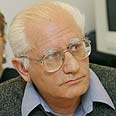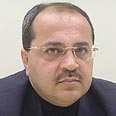
Prof. Smooha. Bridging the gaps
Photo: Avigail Uzi

MK Ahmed Tibi. Constant opposition
Photo: Erez Ehrlichman
The political views held by Arab leaders in Israel are much more radical than those of the public they claim to represent, a new study conducted by Prof. Sammy Smooha of the Haifa University revealed Monday.
Radical Leader?
In interview with Ynet, Israeli-Arab Knesset member Ahmad Tibi says he believes Israel should not be a Jewish nation-state due to its 'Palestinian minority'
Smooha, a professor at the university's Sociology and Anthropology faculty, measured in his study the "Arab-Jews relations index" in Israel, based on interviews with 700 Israeli-Arabs and 85 public leaders of the sector, mostly the heads of Arab parties.
"The leaders are much more radical than their followers on a variety of issues," Smooha claimed in the conclusion of his research. According to the study, while 60.2 percent of voters for Arab parties agree that Arab citizens should accept Israel as a Jewish and democratic state, only 18.2 percent of the leaders concur.
Moreover, Smooha discovered that although 85.7 percent of the public leaders define themselves as anti-Zionists, only 32 percent of their constituency identify with this definition. The study also revealed that only 22.4 percent of leaders are willing to forego the right of return for Palestinians, and to agree that refugees will be allowed to return to the Palestinian state with proper compensations, in comparison to 65.4 percent of their electorate.
Notably, a mere 7.3 percent of voters for the Arab parties accept the use of illegal demonstrations as a legitimate method of struggle, compared to 34.7 percent of their leaders, and only 44.9 of leaders, in comparison to an overwhelming majority of 82.1 percent of their backers, agree that once a settlement to the Palestinian problem is reached, demands on both sides should cease and the dispute will come to an end.
Better representation needed
The study's findings validate the belief common among the Jewish public and establishment, according to which the central Arab leadership is more extreme than the people it represents.
"If the views of the unofficial leadership are more radical than of those who vote for Arab parties, than they are much more so when compared to the views of Arab citizens who back Jewish parties, and the views of the Arab public as a whole," Prof. Smooha stated.
Prof. Smooha explained the findings by the fact that most leaders who are not part of the establishment maintain constant opposition to the ruling parties, and do not take part in making decisions and running the country.
"This distance from responsibility and governmental work allows them to maintain their ideological purity and does not compel them to be flexible or compromise. A leader kept away from the realm of ruling is unable to provide his public with real solutions, and therefore must settle for promoting his ideas in order to gain support," Prof. Smooha explained.
Smooha said he believes that if Arabs are granted better participation and representation within the government, this may contribute to a bridging of the ideological gaps between them and the Jewish population in the country.















